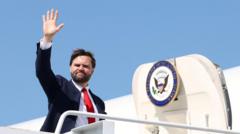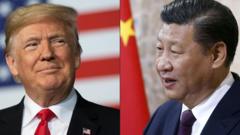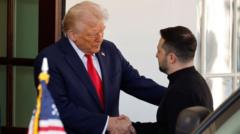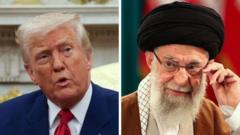As President Trump marks 100 days in his second term, his foreign policy approach is characterized by unpredictability, enormity, and a strategic shift towards transactional relationships, leaving allies uncertain and drawing critiques from various quarters.
Trump's Chaotic Diplomacy: A Retrospective on 100 Days of Transactional Politics

Trump's Chaotic Diplomacy: A Retrospective on 100 Days of Transactional Politics
An exploration of President Trump's controversial foreign policy decisions in his second term, highlighting a focus on exploitative diplomacy.
In the early hours of a Munich morning, the urgency in the vice president's aide's voice was palpable as he sought to secure a critical minerals deal from Ukraine. This scene, reflecting the turbulent nature of U.S. diplomacy under President Trump's second administration, underscores a pattern: a foreign policy driven by transactional instincts rather than alliances. As outlined in numerous accounts, Trump’s dealings over the past 100 days have been marked by arrangements that many consider being exploitative, as he navigates the complex landscape of international politics.
In stark contrast to traditional diplomacy, which often values stable alliances, Trump’s approach has been characterized by unpredictability, often encouraging a sense of isolationism. From contentious negotiations regarding NATO commitments to trade disputes, the new administration appears to wield a proverbial wrecking ball against longstanding agreements. Instances such as the stalled meeting with Ukraine's President Volodymyr Zelensky further exemplify the chaotic dynamic.
Emerging from the first days of this presidency, Trump’s imposition of tariffs—especially towards China—has resulted in retaliatory measures that have disrupted the existing global trade system. This back-and-forth has left American allies scrambling as they attempt to navigate their own strategies amidst rising tensions. Additionally, the potential pullback of U.S. troops from Europe has invoked palpable anxiety among European officials, emphasizing the precarious nature of security arrangements that have prevailed since World War II.
As we analyze these foreign policy developments, the implications for both America and its international relationships have started to surface. Allies begin to reevaluate their ties with the U.S. while adversaries adapt to a new status quo—one defined less by cooperation and more by self-interest. The trajectory of Trump's administration casts a long shadow over the global order, suggesting a future where diplomacy leans heavily on transactional negotiations over mutual understanding and collaboration.




















